
Andrzej Żuławski was a Polish film director and writer. Żuławski often went against mainstream commercialism in his films, and enjoyed success mostly with European art-house audiences.

Andrzej Witold Wajda was a Polish film and theatre director. Recipient of an Honorary Oscar, the Palme d'Or, as well as Honorary Golden Lion and Honorary Golden Bear Awards, he was a prominent member of the "Polish Film School". He was known especially for his trilogy of war films consisting of A Generation (1955), Kanał (1957) and Ashes and Diamonds (1958).
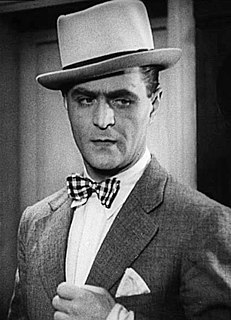
Adolf Dymsza was a Polish comedy actor of both the pre-World War II and post-war eras. He starred in both theatre and film productions, mainly before World War II. He and Kazimierz Krukowski performed as the duo Lopek and Florek in kleynkunst productions at Qui Pro Quo and other noted Warsaw cabarets. Another pseudonym was "Dodek." He was arguably the most popular Polish comic actor of the 1930s, Andrzej Wajda remarked once, that for him Dymsza and Bodo were symbols of pre-war Polish cinema in general. To this day he is considered the king of Polish film comedy.

Knife in the Water is a 1962 Polish psychological thriller film co-written and directed by Roman Polanski in his feature debut, and starring Leon Niemczyk, Jolanta Umecka, and Zygmunt Malanowicz. Its plot follows a husband and wife who are accompanied on a boating trip with a young male hitchhiker, who spurs a number of escalating confrontations between the couple.

The Leon Schiller National Film School is a Polish academy for future actors, directors, photographers, camera operators and television staff. It was founded on 8 March 1948 in Łódź (Lodz).
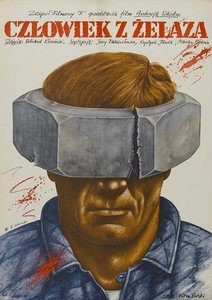
Man of Iron is a 1981 film directed by Andrzej Wajda. It depicts the Solidarity labour movement and its first success in persuading the Polish government to recognize the workers' right to an independent union.

Man of Marble is a 1977 Polish film directed by Andrzej Wajda. It chronicles the fall from grace of a fictional heroic Polish bricklayer, Mateusz Birkut, who became the Stakhanovite symbol of an over-achieving worker, in Nowa Huta, a new socialist city near Kraków. Agnieszka, played by Krystyna Janda in her first role, is a young filmmaker who is making her diploma film on Birkut, whose whereabouts seems to have been lost two decades later. The title refers to the propagandist marble statues made in Birkut's image.

Janusz Andrzej Głowacki, better known as Janusz Głowacki or colloquially simply as Głowa, was a Polish playwright, essayist and screenwriter. Głowacki was the recipient of multiple awards and honours, including Guggenheim Fellowship, two Nike Award nominations and BAFTA Award nomination. He was awarded the Gloria Artis Gold Medal in 2005 for his contribution to Polish culture, and in 2014, the Commander's Cross of the Order of Polonia Restituta.

Korczak is a 1990 black-and-white biographical war film directed by Andrzej Wajda and written by Agnieszka Holland, about Polish-Jewish humanitarian Janusz Korczak. An international co-production between Poland, Germany and the United Kingdom, it stars Wojciech Pszoniak as Korczak, with Ewa Dałkowska, Teresa Budzisz-Krzyzanowska, Marzena Trybala, Piotr Kozlowski, Zbigniew Zamachowski and Jan Peszek.
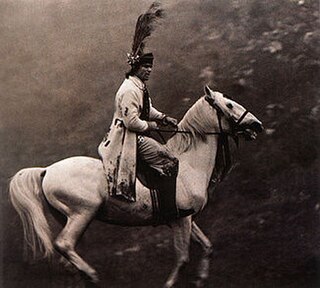
Wesele is a motion picture made in 1972 in Poland by Andrzej Wajda as an adaptation of a play by the same title written by Stanisław Wyspiański in 1901. Wajda also directed "Wesele" for the theatre.

Małgorzata Braunek was a Polish film and stage actress.
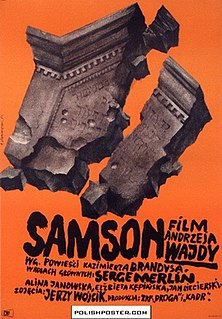
Samson is a 1961 Polish film directed by Andrzej Wajda that uses art house aesthetics to tell a story about the Holocaust. Wajda's World War II film alludes to the Old Testament story of Samson, who had supernatural physical strength. But unlike the Biblical character, Wajda's Samson has great emotional strength.
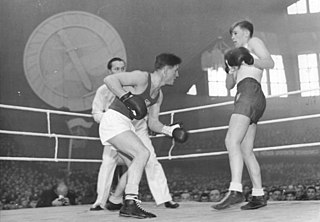
Leszek Melchior Drogosz was a Polish boxer and actor.

Landscape After the Battle is a 1970 Polish drama film directed by Andrzej Wajda and starring Daniel Olbrychski; telling a story of a Nazi German concentration camp survivor soon after liberation, residing in a DP camp somewhere in Germany. It is based on the writings of Holocaust survivor and Polish author Tadeusz Borowski. In most part, the plot revolves around the events depicted in Borowski's short story called "Bitwa pod Grunwaldem" from his collection This Way for the Gas, Ladies and Gentlemen. The film was entered into the 1970 Cannes Film Festival.
Five Boys from Barska Street is a 1954 Polish drama film directed by Aleksander Ford, based on the 1952 novel of the same name by Kazimierz Koźniewski. It was awarded the International Prize at the 1954 Cannes Film Festival.
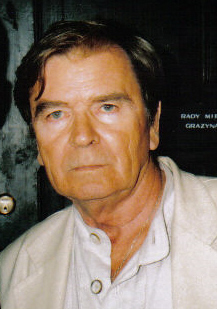
Zygmunt Malanowicz was a Polish film actor. He appeared in more than 30 films from 1962 to 2020.
Przedsiębiorstwo Realizacji Filmów "Zespoły Filmowe" was a Polish state-owned film studio founded in 1969 after the closure of the production company Zespoły Autorów Filmowych in the aftermath of the March 1968 events.

Everything for Sale is a 1969 Polish drama film written and directed by Andrzej Wajda. The film was selected as the Polish entry for the Best Foreign Language Film at the 42nd Academy Awards, but was not accepted as a nominee.

Holy Week is a 1995 Polish drama film directed by Andrzej Wajda. It was entered into the 46th Berlin International Film Festival where it won the Silver Bear for outstanding artistic contribution.
Barrier is a Polish drama film directed by Jerzy Skolimowski, released in 1966. The hero quits his studies, resolving to seek social advancement by any means. A new girlfriend changes his mind.

















